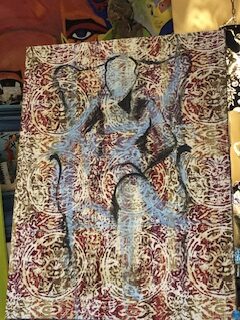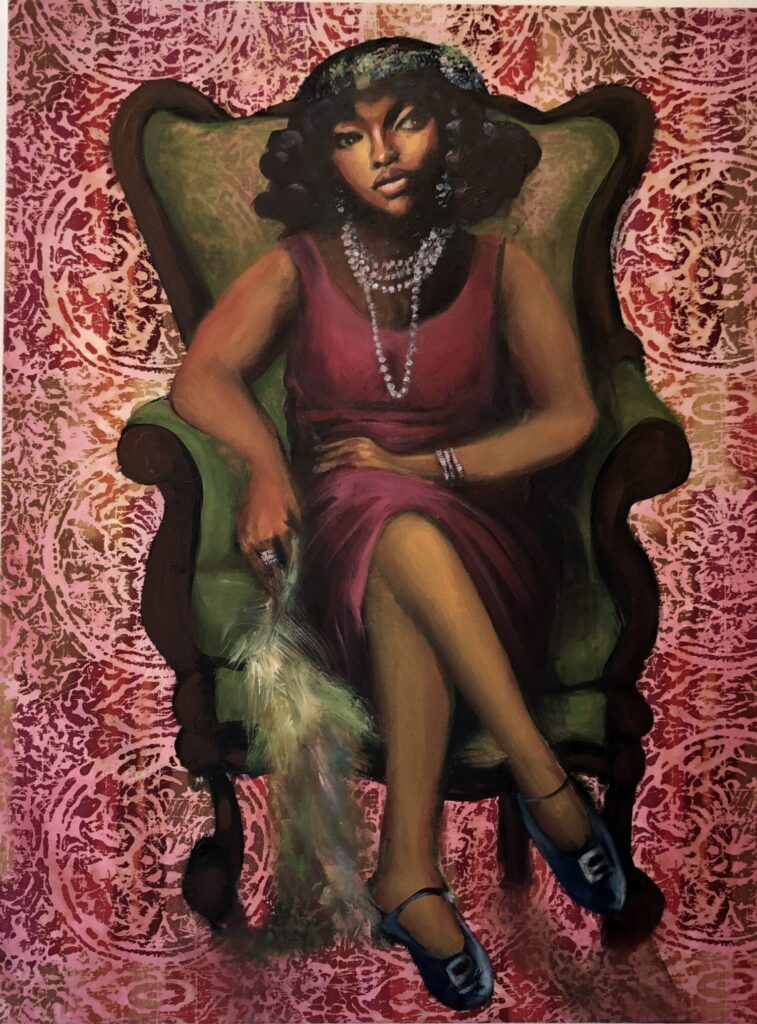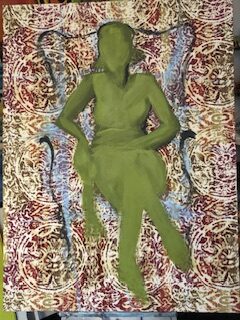Easy Chair



The Easy Chair
36 x48
Acrylic and Oil on Canvas
If I Can't Sell It, I'll I’ll Keep Sittin’ On It (Original) – Georgia White
Popular Verions: If I Can’t Sell It, I’ll Keep Sittin’ On It – Ruth Brown
Also recorded by:
Les Paul & Georgia White; Shirley Johnson and others.
Songwriters: Alex Hill / Andy Razaf
I own a secondhand furniture store and I think my prices are fair
That is until this real cheap guy came in one day
Saw this chair he wanted to buy, but he wouldn't, claimed the price was too high
So I looked him straight in his eye, and this was my reply.....
If I can't sell it, I'm gonna sit down on it
Why should I give it away
Now, darlin', if you want it, you gotta buy it
And I mean just what I say
Now, how'd you like to find this waitin at home for you every night
Only been used once or twice and it's still nice and tight
Whoaw! But if I can't sell it, I'm gonna keep sittin on it
I don't see the need to give it away
Now, you can't find a better pair of legs in town
And a back like this, hah, not for miles around
And that is why if I can't sell it, I'm gonna recline upon it
Why should I give it away
Because it's made for comfort, built for wear and tear
Where else would you find such a easy chair, hah-hah-hah
Oh, but if I can't sell it, I am going to remain seated on it
I ain't about to give it away
Oh, because it's lush, plush, slick and sleek
Darlin', a high class piece like this at any price is cheap
So, if I can't sell it, I'm gonna remain seated on it
I don't see the need to give it away
Now, look at this nice bottom, ain't it easy on the eye
Guaranteed to support any weight or size
But if I can't sell it, I'm gonna sit down on it
I ain't about to give it away
You know I have really had my fill of folks always comin' around with their hand
stuck out
Want somethin' and don't want to give nothin'
Now, if you want this, put your hand in your stash and gimme some cash
If you want somethin' for free, go to the Salvation Army, don't come to me
Now this is not Saint Vincent de Paul's place, this is Ruth's place Read my lips
NO FREE TRIPS!
Sometimes the following final verse is added:
And you can look at me and see I have not been starvin', darlin'
Now I have a few diamonds that I haven't even taken off to dust lately
Now you are not getting anything around here for free
Show me the colour of your money
GOODBYE!
Georgia White
Georgia White was an American blues singer, most prolific in the 1930s and 1940s. White was born in Sandersville, Georgia in 1903. By the late 1920s she was singing in clubs in Chicago. She made her first recording, "When You're Smiling, the Whole World Smiles With You," with Jimmie Noone's orchestra in 1930.
Georgia was born in Sandersville, Georgia, USA in 1903.
Little is known of her early life, but by the late 1920s she was singing in clubs in Chicago. She made her first recording, "When You're Smiling, the Whole World Smiles With You," with Jimmie Noone's orchestra in 1930. She returned to the studio in 1935, and over the next six years recorded over 100 tracks for Decca Records, usually accompanied by the pianist Richard M. Jones and also, in the late 1930s, by the guitarist Lonnie Johnson.
She also recorded under the name Georgia Lawson. Her tracks included "I'll Keep Sitting on It," "Take Me for a Buggy Ride," "Mama Knows What Papa Wants When Papa's Feeling Blue," and "Hot Nuts." Her best-known song was "You Done Lost Your Good Thing Now" (1935).
White formed an all-female band in the 1940s. She also performed with Bumble Bee Slim. She joined Big Bill Broonzy's Laughing Trio in 1949 as pianist. "She was very easy to get along with," said Broonzy, "real friendly." She was a club singer in the 1950s, finally performing in 1959 in Chicago. She then resumed performing on weekends at the Blue Pub, a bar on Irving Park Road near the Kennedy Expressway, where she quickly won a loyal following. She sang many of her famous songs, including "Maybe I'm Wrong Again," a ballad from an early Bing Crosby movie.
One of her songs, "Alley Boogie" which was recorded on 9 November 1937 was used as the theme music for the British romantic comedy drama series, Love Soup (2005).
Ruth Brown
Born Jan. 12, 1928, Portsmouth, Va., U.S.—died Nov. 17, 2006, Las Vegas, Nev., was an American singer and actress, who earned the nickname “Miss Rhythm” while dominating the rhythm-and-blues charts throughout the 1950s. Her success helped establish Atlantic Records (“The House That Ruth Built”) as the era’s premier rhythm-and-blues label.
Brown released her first recording, “So Long.” Abetted by Atlantic’s cofounder Herb Abramson and songwriter Rudy Toombs, she became the most popular female rhythm-and-blues singer of the 1950s with a string of number one hits that included “Teardrops from My Eyes” (1950), “5-10-15 Hours” (1952), and her signature tune, “(Mama) He Treats Your Daughter Mean” (1953). After years of having her records covered by white performers, she experienced crossover pop success with “Lucky Lips” (1957) and “This Little Girl’s Gone Rockin’ ” (1958).
Her career began a long decline in the early 1960s. Having survived four failed marriages, she spent the next decade driving a bus and cleaning houses while raising two sons. She began acting in the mid-1970s, first in television situation comedies and then in films and on the stage. In 1989 she won a Tony Award for best performance by a leading actress for the musical Black and Blue, and in 1990 she won a Grammy Award for best jazz vocal by a female. A champion of musicians’ rights, she spoke out against exploitative contracts, and in the 1980s she eventually received some back royalties from Atlantic. Brown, whose principal influences were Ella Fitzgerald and Billie Holiday, was inducted into the Rock and Roll Hall of Fame in 1993. Her memoir, Miss Rhythm (cowritten with Andrew Yule), was published in 1996.